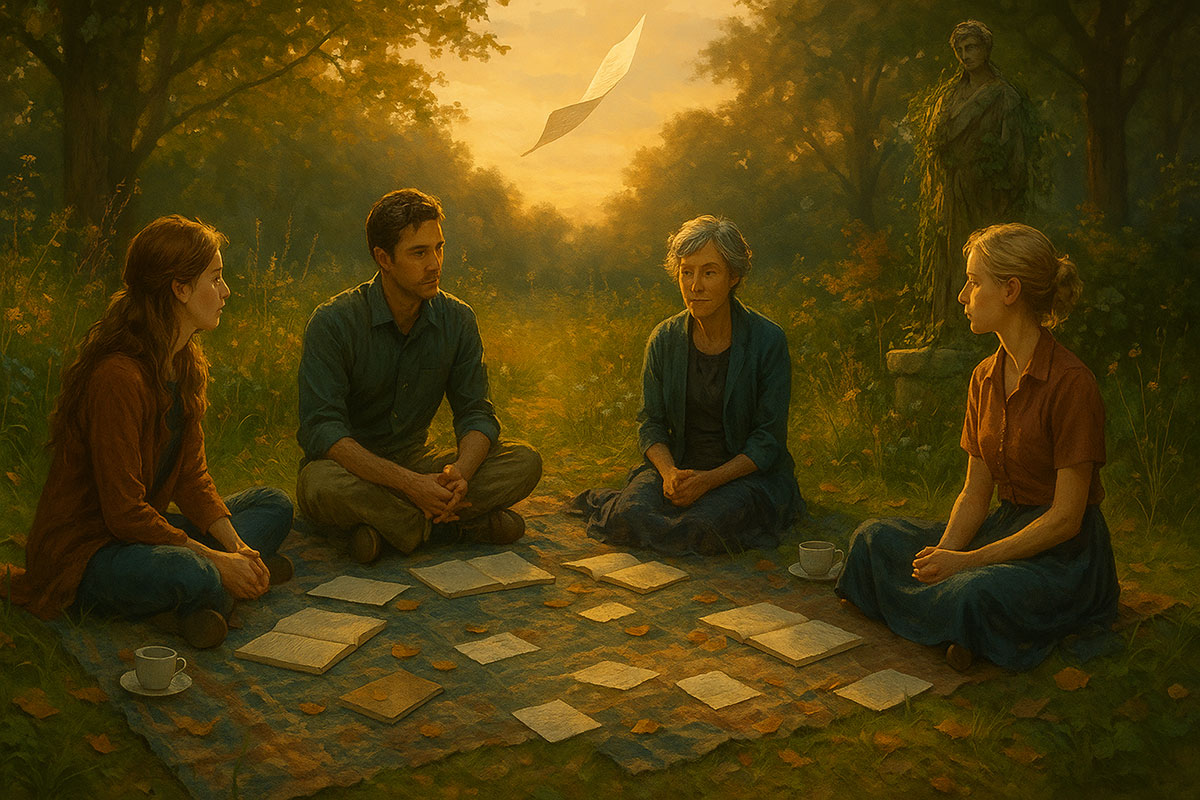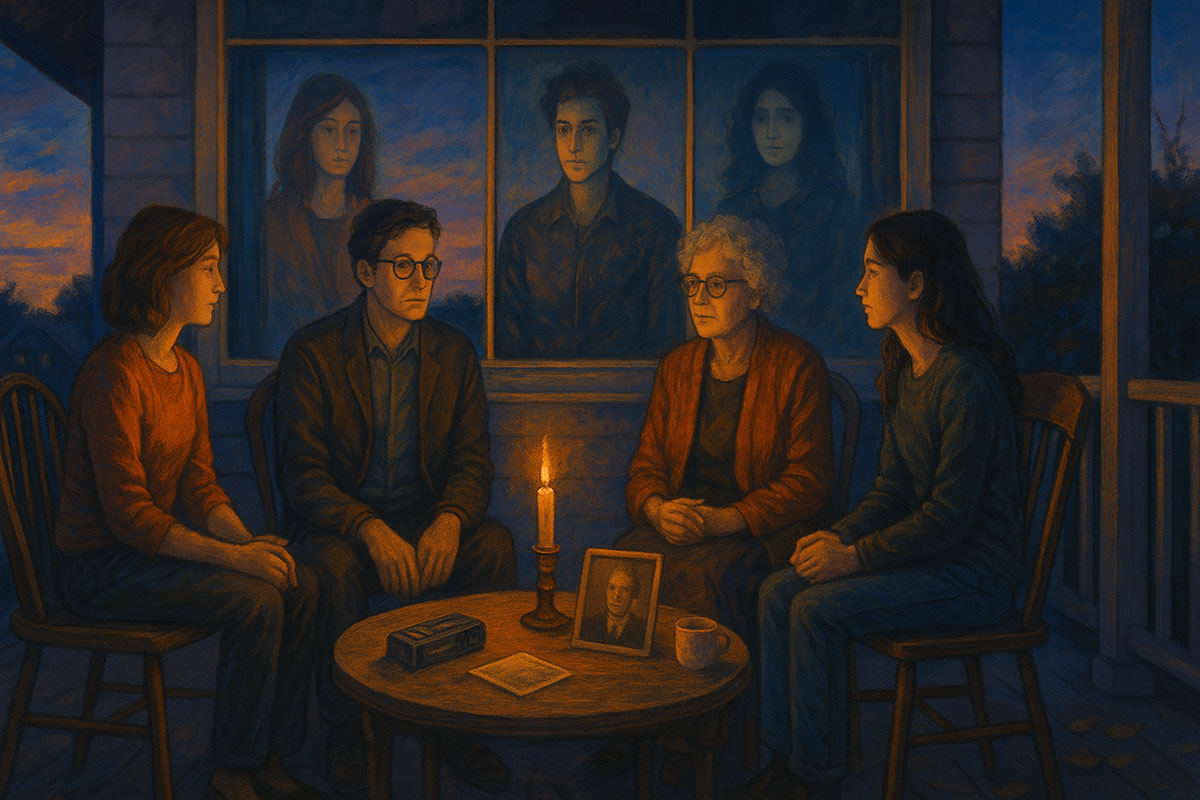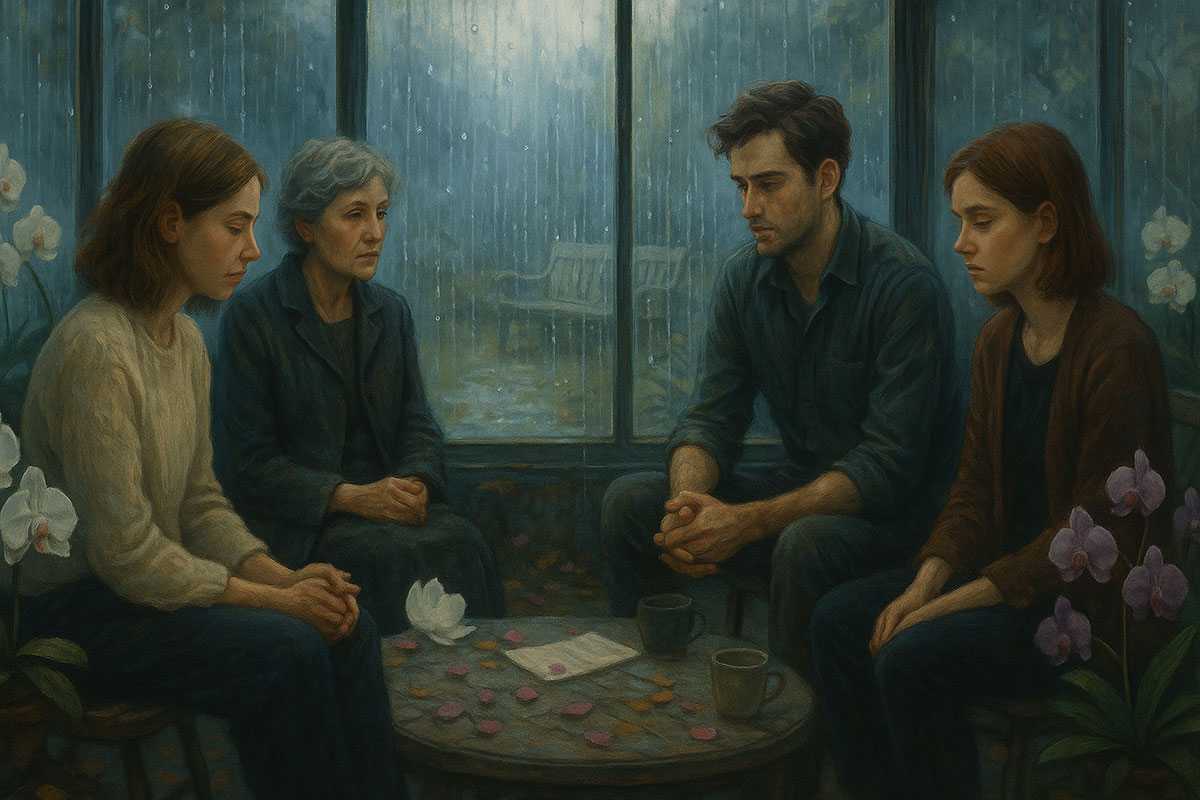
|
Getting your Trinity Audio player ready...
|

Emily Henry:
There’s a question I kept asking myself as I wrote Great Big Beautiful Life:
What happens to a story when the person telling it doesn’t trust their own voice anymore?
This book began as a mystery—a journalist chasing the secrets of a woman the world had half-forgotten. But it quickly became something more intimate. A layered meditation on grief, memory, and the quiet beauty of things left unresolved.
Margaret Ives was never meant to be a heroine. She was a contradiction. A woman who disappeared from the spotlight, not because she had nothing left to say—but because the world stopped asking. And yet, in the spaces where she withdrew, others began to speak. Alice Scott. Hayden Anderson. And yes—me.
These conversations are imagined, but the emotions are not. What follows is not a retelling of the book’s plot. It is a deeper listening—to the questions beneath the questions.
Who owns a story?
What happens when love doesn't end neatly?
Can we be redeemed without being explained?
Is beauty possible without closure?
You are not just an observer here.
You are the final witness.
Welcome to the story between the lines.
(Note: This is an imaginary conversation, a creative exploration of an idea, and not a real speech or event.)

Topic 1: Storytelling as Mirror or Mask — Who Gets to Tell the Truth?

Moderator:
Toni Morrison
(Award-winning novelist and editor, chosen for her piercing insights into narrative authority, memory, and the ethics of representation.)
Toni Morrison (leaning forward, voice low and steady):
Let me begin with a question that matters deeply to anyone who’s ever held a pen or a secret:
When we tell someone’s story—are we honoring their truth, or reshaping it to serve our own reflection?
Emily Henry:
I’ve wrestled with this from both sides. As a novelist, I fictionalize—yet I’m always mining real emotions, real echoes. Writing Margaret, I kept asking: Am I building a window or a mirror? The hardest part was realizing that even empathy can be invasive if it insists on being right.
Hayden Anderson:
A biographer is trained to believe in evidence. But no amount of archive can make a person whole. I told myself I was reconstructing a legacy—but maybe I was just shaping it into something I could live with. Which isn’t the same as truth. It’s comfort.
Margaret Ives:
When you’ve been mythologized for decades, the truth becomes a costume too. Sometimes, I gave you lies. Sometimes, I gave you silence. But both were survival. What matters isn’t whether you got me right—it’s whether you understood why I hid.
Alice Scott:
I came to the island thinking I’d uncover a scandal, or at least a scoop. But the deeper I listened, the more I saw pieces of myself in Margaret. That’s the danger—and the beauty—of storytelling. You don’t just describe someone. You start to carry them.
Toni Morrison (nodding):
And what if that weight changes you? Let’s dig deeper.
Toni Morrison:
So let me ask this now:
Can storytelling ever be free from power? Or is every narrative, by nature, an act of control?
Hayden Anderson:
Storytelling is always power. You decide what gets a chapter and what becomes a footnote. I’ve written biographies that haunted me—because I realized too late that I’d taken a life and made it linear. No one lives that way. But books do.
Alice Scott:
Even kindness can be power. I wanted to tell Margaret’s story gently. But wasn’t I still deciding what parts of her deserved gentleness? I thought I was honoring her. But now I wonder: was I softening her to make her acceptable?
Emily Henry:
Writers don’t just build stories—they decide beginnings and endings. That’s a godlike power. But I try to wield it with trembling hands. You can’t escape the fact that telling someone’s story means changing it. The question is: will you distort it for drama, or risk the messiness of truth?
Margaret Ives:
Let’s be honest. Everyone who’s ever written about me—lovers, journalists, even fans—took something from me. Some carved statues. Some left scars. But none of them asked me what I wanted remembered. That silence… that’s power too.
Toni Morrison (quietly):
You all touch the wound. Now let’s talk healing.
Toni Morrison:
Final question.
If the past can never be fully told, what does it mean to try? Why do we keep writing, knowing we’ll never get it quite right?
Margaret Ives:
Because we need to be seen—even if the picture’s blurry. I never wanted a perfect portrait. Just one with warmth. Maybe writing isn’t about accuracy. Maybe it’s about longing.
Emily Henry:
I write to get close. Not to facts, but to essence. To the heartbeat beneath the myth. Maybe the point isn’t to pin someone down—it’s to accompany them for a while. On the page. In the reader’s heart. In the silence after the last sentence.
Hayden Anderson:
We write because memory fails. And yet memory is all we have. That contradiction is maddening. But also... beautiful. Every story is a flawed tribute. A love letter we keep revising.
Alice Scott:
Trying to write Margaret’s story taught me that the act of trying is the most sacred thing. Not the final draft. Not the acclaim. Just the sitting-with, the witnessing, the daring to say: You mattered.
Toni Morrison (smiling faintly):
And in that daring, we live again. Not as fact. But as feeling. And sometimes, that’s enough.
Topic 2: Love as Subtext, Not Always the Plot

Moderator:
Ocean Vuong
(Poet and novelist whose work delicately explores grief, intimacy, and the spaces where love hides. Chosen for his emotional sensitivity and lyrical clarity.)
Setting: A quiet sunroom in Margaret’s estate. Rain taps gently on the glass. Tea steams on the table. Each guest holds a different kind of ache.
Ocean Vuong:
We’re told love should be loud—romantic, transformative, cinematic. But in real life, love often whispers. Sometimes it never even speaks.
Let me begin by asking:
What happens when love doesn’t follow the plot? When it arrives late, leaves early, or never shows up the way we hoped?
Alice Scott:
It confuses everything. I built my life around stories with tidy arcs. But love… it interrupts. It lingers in the wrong scene. I think I loved Hayden most in the moments I couldn't write down—the ones that never made it into the draft. And that terrified me. Because if it couldn’t be shaped, could it be trusted?
Margaret Ives:
I was loved in headlines. Then in secrets. And finally, not at all. The realest love I knew wasn’t public or passionate—it was quiet, inconvenient, and left behind no photographs. Sometimes love doesn’t change your life. It simply haunts it.
Emily Henry:
Writing romance taught me that love isn’t always the resolution. Sometimes it’s the wound that stays open. And sometimes it’s not romantic at all. It’s how a mother speaks without saying sorry. It’s how a character breaks your heart and heals you anyway.
Hayden Anderson:
I left Alice behind because I didn’t want to become a love interest in her story. But I kept reading her emails. Listening to old voicemails. I kept a note she wrote me tucked inside my passport. So what does that make me? A man who left? Or a man who never really did?
Ocean Vuong:
What you’re all describing... it’s not the love they sell in songs. It’s the kind that leaves fingerprints on silence.
So tell me:
Is there a kind of love that doesn’t want to be claimed—only witnessed?
Margaret Ives:
Yes. And it’s the most honest kind. I once loved someone so fiercely, I let them go. Not out of nobility, but fear. That love lives in my memory, untouched. If I had kept him, I might have ruined him. Letting him exist in the past preserved him. Maybe that was the only way I knew how to love.
Hayden Anderson:
When I interviewed widows for a book, I realized something: their deepest grief wasn’t about loss. It was about having no one left to remember with. Love wants a witness. Not ownership. Not proof. Just someone who says, Yes, that happened. Yes, you felt that.
Alice Scott:
There were days I didn’t know if Hayden ever cared. But I kept writing letters I never sent. That was love too. Not the kind you post about. The kind that waits in drafts and breathes through unsaid words.
Emily Henry:
I write love stories. But the ones that last for me are about presence, not possession. Love that lets someone change. Love that allows an ending. Love that’s brave enough to remain unspoken.
Ocean Vuong:
That kind of love is like poetry—felt in rhythm more than reason. So let me ask one final thing:
How do we live with the love that never became anything? That didn’t break us, but also didn’t stay?
Alice Scott:
I carry it like a scent—on old clothes, in songs I used to skip. I don’t try to forget. I just try to make peace with its ghost.
Hayden Anderson:
Sometimes I open the book I never wrote about Alice. There are only three pages. But they’re enough. Loving her didn’t ruin me. Not loving her fully? That’s what I still write around.
Emily Henry:
Unrealized love can still be formative. It teaches us to hold without clinging. To feel without fixing. I’ve come to see it as a kind of grace. Painful, yes. But illuminating.
Margaret Ives:
I never married. I never had children. But I did love. And I let it remain unfinished. Not every story has to be told in full to be real. Some loves are like half-written songs—you hum them when you’re alone, and that’s enough.
Ocean Vuong (softly):
Sometimes love’s greatest offering is its incompletion. It asks nothing—only that we remember where it touched us.
Topic 3: The Past as Weight—and as Redemption

Moderator:
Colson Whitehead
(Pulitzer Prize–winning novelist known for confronting history with sharp wit and unflinching humanity. Chosen for his ability to explore memory, trauma, and the burden of truth with clarity and compassion.)
Setting: The estate’s old ballroom. Dust swirls in shafts of morning light. Faded portraits line the cracked walls. A piano in the corner remains unopened, its last note long silent.
Colson Whitehead:
Let’s begin with what’s obvious, yet often unspoken.
What part of your past weighs the most—and how have you learned to carry it?
Margaret Ives:
My silence. I kept quiet when I should have screamed. About my lover. About my brother. About the cost of being seen. And yet, my silence bought me time. Sometimes what weighs most isn’t what we did, but what we let happen by doing nothing.
Alice Scott:
My past weighs in expectation. I was raised to be sunny, likable, light. But inside I was carrying grief I hadn’t named. Writing Margaret’s story forced me to unpack it—to admit that my mother’s absence left a hole I tried to fill with achievement. Smiles are heavy when they’re armor.
Emily Henry:
I carry the pages I didn’t write. Stories I was too afraid to tell—about pain that felt too small, too personal, too unmarketable. But over time I’ve learned that shame can become soil. You bury it, and sometimes something true grows.
Hayden Anderson:
Mine is a mistake. A book I wrote too soon. About a woman I misunderstood. I won awards for that story—but I think I wounded her in the process. Now I question everything I write. Not because I don’t believe in truth—but because I know how much it can cost.
Colson Whitehead:
Truth has a weight, sure. But so does memory. So tell me this:
Can the past ever really be redeemed? Or does redemption just mean learning how to live beside it?
Alice Scott:
I think redemption looks like conversation. Like this. Sitting at the table with the parts of yourself you tried to avoid. I don’t need to rewrite my childhood. I just need to stop pretending it didn’t shape me.
Hayden Anderson:
I used to believe in redemption like it was a plot point. Now I think it’s messier. Slower. Sometimes all you get is a new question. Or a better apology. And that has to be enough.
Margaret Ives:
I lived for decades hoping someone would come back and say, “I forgive you.” But no one ever did. So I had to become that voice for myself. Redemption, for me, meant naming what I lost—and then choosing to keep living anyway.
Emily Henry:
I think redemption isn’t about fixing the past. It’s about giving it a softer place to land. In fiction, we call it resolution. In life, it’s something closer to kindness. Toward the version of you that didn’t know better yet.
Colson Whitehead:
So what we’re really saying is: the past doesn’t leave—but it can soften. One last question.
What do you wish someone had said to the version of you who was still inside the pain?
Emily Henry:
“This too is a story worth telling.” I wish someone had said that to the girl who was quiet at the party, the one who always laughed too hard to keep people from asking questions. I needed to know that even the quiet, tender chapters mattered.
Hayden Anderson:
“You can be wrong and still be worth loving.” I lived in fear of getting people wrong, of failing to capture them. But I wish I’d known that honesty doesn’t require perfection—just presence.
Alice Scott:
“You don’t have to shine to be seen.” I was so good at being okay that no one ever asked if I actually was. I wish someone had told me that I didn’t have to perform to earn care.
Margaret Ives:
“You are not the sum of what you hid.” I spent years believing that my secrets defined me. But maybe the fact that I held them, survived them, is what truly shaped me. And maybe that’s what makes me worthy of being remembered.
Colson Whitehead (gazing at the broken chandelier above):
Maybe redemption isn’t in the rewriting—but in the witnessing.
The past doesn’t vanish. But if we look closely, it can light a way forward.
Topic 4: Storytelling as Connection, Not Resolution

Moderator:
Elizabeth Gilbert
(Memoirist and novelist known for her exploration of vulnerability, creativity, and the redemptive power of narrative. Chosen for her warmth and her deep respect for imperfect, ongoing human journeys.)
Setting: An open-air writing room on the edge of the estate. Wind carries in salt from the sea. Pages are pinned to clotheslines, drying like truth after a storm. Everyone is barefoot.
Elizabeth Gilbert:
We often think of storytelling as something with a beginning, middle, and end. But some of the most meaningful stories don’t resolve—they just connect us.
Let me ask you:
Have you ever told a story not to explain something—but simply to feel less alone?
Emily Henry:
Every novel I’ve ever written began in that loneliness. I used to write to figure things out. Now I write to feel accompanied. The characters don’t solve me—but they sit beside me when I can’t find the answers. Sometimes that’s enough.
Alice Scott:
When I first started interviewing Margaret, I thought I was collecting facts. But by the second week, I realized I was telling her pieces of my own story too. Not for symmetry. For solidarity. I didn’t need her to fix me—I just needed her to nod and say, “Me too.”
Hayden Anderson:
In my early career, I wrote to be respected. Now I write to be understood. And when I told my story of failure—the one about the biography I regretted—I got more letters than for any award-winning piece. Connection lives in what we’re willing to admit.
Margaret Ives:
I’ve spent a lifetime being written about. But I never felt truly with someone until I started sharing my memories—on my terms, in my voice. Those stories didn’t fix the past. But they gave me companions for the shadows.
Elizabeth Gilbert:
That companionship—that sacred intimacy—is the heart of what we’re exploring.
So now I ask:
Why do some of our most powerful stories have no clear conclusion? What does it mean to leave a story open?
Hayden Anderson:
Because life rarely wraps things up. It just moves sideways. Some of the people I’ve loved most are still question marks in my timeline. So why pretend fiction should have sharper edges than reality?
Emily Henry:
I used to tie every novel in a bow. But lately, I’ve been drawn to frayed endings. Ones that breathe. Ones that trust the reader. There’s a kind of faith in leaving the door ajar, in saying: “I’ll see you in another life, or another draft.”
Margaret Ives:
My story didn’t end when the newspapers stopped printing my name. It didn’t even end when my lover died. I kept evolving, even when no one was watching. That’s what open stories understand—that we’re always still becoming.
Alice Scott:
There’s a line I didn’t include in my final manuscript. It said, “I loved her. And I didn’t always know how.” I left it out because I didn’t have the right ending for it. But now I think that line was the ending. Unfinished. But true.
Elizabeth Gilbert:
So here’s the last question—simple, but not easy.
What story are you still learning how to tell?
Alice Scott:
The one about my mother. The one where I stop pretending it didn’t hurt. The one where I allow myself to grieve someone who’s still alive.
Margaret Ives:
The story of my joy. I’ve been so wrapped in shadows and secrets that I sometimes forget I’ve also known real, reckless happiness. I want to tell that story. If only to remind myself it happened.
Hayden Anderson:
The story where I’m the one being forgiven. I’ve spent so much time narrating others that I forgot how to write from inside my own shame. That’s the hardest voice to access—my own.
Emily Henry:
I’m still learning how to tell the story of enough. That I am enough. That not every book needs to be brilliant. Not every love needs to last. Not every pain needs to be profound. Just honest.
Elizabeth Gilbert (smiling, voice full of sunlight):
And that, my friends, is the truest kind of connection—the courage to keep telling a story even before you know how it ends.
Topic 5: What Makes a Life Beautiful — Even If It’s Unfinished?

Moderator:
Maggie Smith
(Poet and essayist known for her deeply reflective work on impermanence, motherhood, and rebuilding after loss. Chosen for her gentleness and insight into beauty that lives in the imperfect.)
Setting: A garden at the edge of the estate, overgrown and wild but glowing with golden-hour light. Forgotten statues peek through tall grass. The group sits on a patchwork of blankets. Bees buzz. Time slows.
Maggie Smith:
The title of this novel suggests a certain irony: Great Big Beautiful Life. And yet what we’ve seen is grief, silence, longing—threaded with flashes of hope.
So I want to begin by asking:
What does it mean to live a beautiful life, especially when so much of it feels unfinished?
Margaret Ives:
I once thought beauty was control—composure, wealth, a perfect photograph. But in the end, the most beautiful moments of my life were the messy ones. The ones with no camera. No audience. Just bare hands and trembling choices.
Emily Henry:
To me, a beautiful life is not one that’s tidy—it’s one that’s felt. Deeply, even painfully. We want symmetry. But beauty often lives in the lopsided places. The parts that almost broke us but didn’t.
Hayden Anderson:
I lived so much of my life chasing completeness—finishing projects, making points. But the most profound experiences I’ve had were unresolved. Love that didn’t last. Questions that didn’t get answers. And yet—they linger. That’s what beauty does. It lingers.
Alice Scott:
A beautiful life, to me, is one where you still believe in light. Even if you’ve seen the dark. Even if you didn’t always rise gracefully. I used to think optimism was naivety. Now I think it’s courage.
Maggie Smith:
You’ve all touched something fragile and essential. Let’s go deeper.
What have you let go of—an identity, a dream, a person—that hurt to release but made space for something truer?
Alice Scott:
I let go of being "the cheerful one." The girl who smoothed everything over. That identity kept me safe, but also small. Letting it go felt like losing control. But in that space, I found something better: honesty. Even when it was raw.
Hayden Anderson:
I let go of the idea that writing someone’s life made me understand them. Or that telling a story preserved it. What I’ve learned is that stories aren’t monuments. They’re conversations. And I can’t control where they go.
Margaret Ives:
I let go of the man I loved. I let go of my reputation. I let go of being misunderstood. All of it hurt. But it made room for something new—quiet. Peace. And for the first time, the ability to see myself not through others’ eyes, but my own.
Emily Henry:
I let go of the fear that softness made me weak. That writing emotionally made me less literary. That writing popular books made me less serious. When I released that fear, I finally began to write from my whole heart—and readers noticed.
Maggie Smith:
That’s the paradox, isn’t it? Letting go often reveals what matters most. One last question.
If this was the last conversation you ever had, what would you want to be remembered for?
Emily Henry:
That I made people feel less alone. That I wrote stories that made people whisper, “Me too,” even if just in their own minds.
Hayden Anderson:
That I tried to tell the truth—even when I failed. That I stayed curious. That I let people grow beyond what I wrote about them.
Alice Scott:
That I kept trying to love the world—even when it didn’t always love me back. And that I listened more than I spoke.
Margaret Ives:
That I didn’t disappear completely. That somewhere in the pages, someone saw me not as a headline—but as a woman who lived, who longed, who mattered.
Maggie Smith (softly):
And I hope, dear ones, you’re remembered not for what you resolved—but for what you risked. For the beauty you made in the middle of things.
Final Thoughts by Emily Henry
If there’s one thing I’ve learned from these characters—these ghosts and echoes I’ve come to love—it’s this:
A life doesn’t need to be complete to be meaningful.
A story doesn’t need to resolve to be true.
Love doesn’t need to last to have mattered.
We live in an era obsessed with conclusions. We want the villain exposed, the lovers reunited, the hero changed. But so much of real life is quieter than that. More unfinished. More real.
Margaret Ives never asked to be remembered. But in telling her story—flawed, fractured, and full of unspoken tenderness—I found my own voice again. And maybe that’s what beauty really is: not perfection, but presence. Not answers, but witness.
So if you’ve read this far, if you’ve listened to them—thank you.
You’ve made this story beautiful.
Not by finishing it.
But simply by being here.
Short Bios:
Emily Henry
Bestselling author known for emotionally resonant fiction that blends romance, humor, and literary depth. In Great Big Beautiful Life, she steps into more introspective territory, exploring memory, authorship, and legacy.
Margaret Ives
A reclusive heiress and former social icon whose mysterious past forms the emotional core of the novel. Elegant, complex, and haunted by her own silence, she is both subject and keeper of the story.
Alice Scott
A bright, emotionally intuitive journalist seeking her big break. Initially drawn to Margaret’s story for professional gain, Alice ultimately finds her own voice—and healing—through the act of listening.
Hayden Anderson
A Pulitzer-winning biographer, meticulous and guarded. Haunted by a past writing mistake, he approaches Margaret’s life with caution, only to discover the story reshapes him more than he reshapes it.
Toni Morrison
(Moderator, Topic 1)
Legendary novelist and Nobel laureate whose work explored power, identity, and truth in storytelling.
Ocean Vuong
(Moderator, Topic 2)
Poet and novelist acclaimed for his lyrical meditations on grief, love, and unspoken longing.
Colson Whitehead
(Moderator, Topic 3)
Pulitzer Prize–winning author of historical and speculative fiction that unearths trauma with clarity and compassion.
Elizabeth Gilbert
(Moderator, Topic 4)
Memoirist and novelist celebrated for her insights into creativity, vulnerability, and transformation.
Maggie Smith
(Moderator, Topic 5)
Poet and essayist who explores the intersections of beauty, loss, and resilience with emotional precision.

Leave a Reply